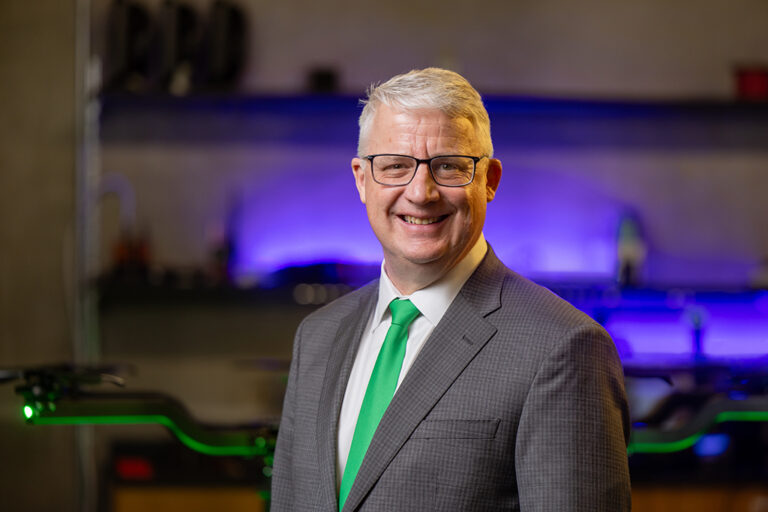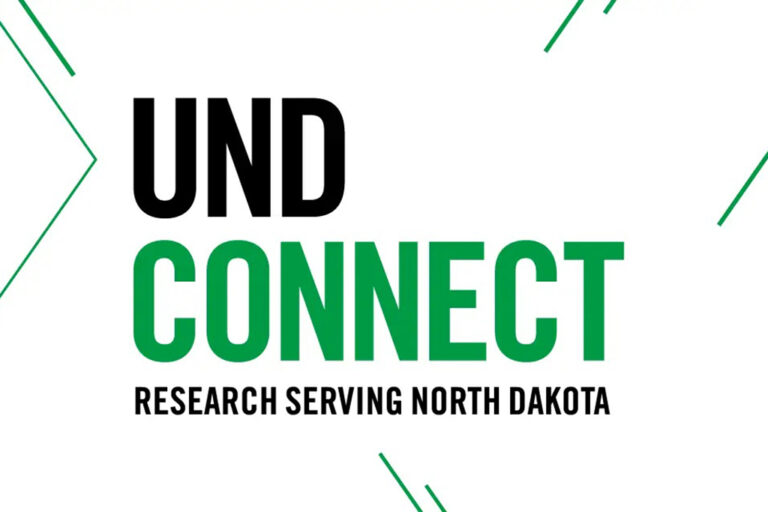Pollution solution in three minutes or less
UND Three Minute Thesis winner prepares for regional stage of research pitches from across the globe

When you’re asked to talk to strangers about your cutting-edge research, in a way that is readily understood, how do you fit everything into three minutes?
If you love what you do, said Nidhal Badrouchi, three minutes is more than enough time.
Badrouchi, winner of UND’s 2021 Three Minute Thesis (3MT) competition, will present a short and sweet version of his Ph.D. research on the regional stage of the annual competition tomorrow, March 24.
UND’s 3MT contest back in February was the University’s School of Graduate Studies’ fifth in five years. Founded by the University of Queensland in Australia, the 3MT competition is meant to highlight student research in a way that celebrates academic and communications prowess. UND’s regional participation is through the Western Association of Graduate Schools.
In that February contest, Badrouchi was awarded first place among 21 UND graduate student competitors for his talk on “green gain solutions” – primarily, the use of carbon dioxide (CO2) at high pressures to release more oil from rock. By means of adsorption, Badrouchi proposes, those very rocks will then help to store CO2 deep beneath the earth’s surface.
In a world where excessive CO2 and other greenhouse gas emissions threaten life as we know it, there is a need to reduce pollution levels while optimizing the consumption of natural resources, he said.
“If we are living in the era of energy and technology advances, the future belongs only to ingenious recycling solutions,” said Badrouchi in his recorded remarks, available for viewing here.
And there is even more of a reason that Badrouchi’s talk turned heads at UND, a reason that has been covered previously by UND Today: each percentage of increased oil recovery in North Dakota’s reservoirs could dramatically boost oil production, pulling hundreds of millions or even billions of new dollars into the state’s economy.
Living the experience
In an odd coincidence, Badrouchi’s 3MT journey is reaching a peak where his journey to UND began: his home country of Tunisia, in the city of Tunis.
In recent weeks, he flew home for a particularly special occasion.
“My wedding is on Saturday, and the 3MT is three days after, so it will be very exciting,” he remarked during an interview with UND Today.
“At least I won’t have to shave my beard again, because I’ll be doing that for the wedding!”
Indeed, Badrouchi will be representing UND from the other side of the globe. Though the UND stage of competition was presented via video recording, a presentation that Badrouchi was able to fine-tune in the weeks leading up to the finals, the regional pitches are happening live.
For someone such as Badrouchi – nearly bursting with energy and anticipation not just about his research, but also about sharing it with others – the format doesn’t matter much.

Before he was recruited to UND by Vamegh Rasouli, professor and chair for the Department of Petroleum Engineering, Badrouchi was working in oil production and refinement. Each week he would have to present his team’s work to upper management, and he loved it, he said.
What he discovered at UND, upon his arrival in 2018, was that his department equally valued opportunities to develop the “soft skills” behind the technical demands of the petroleum industry.
“At the end of the road, the technical knowledge you’ve acquired will be more than enough for your everyday work,” Badrouchi said. “But what you will always use are your abilities to communicate with others. How can you be a leader? How can you manage a team? How can you manage failure?
“Because of that, I found 3MT to be a very good opportunity to work on that aspect. Those are skills you’ll have for a lifetime.”
Badrouchi arrived at UND in the summer of 2018, so it wasn’t until the following February that he saw his first 3MT competition. The School of Graduate Studies’ staging of the event, presented in front of rows of audience members and sponsors, looked “amazing.”
“I wanted to live that experience,” Badrouchi recalled.
Two-in-one
As Rasouli learned more about Badrouchi’s experience and credentials in Tunisia, he thought Badrouchi would be particularly qualified to study how the industry can use captured CO2 to enhance oil recovery.
“I was impressed with that idea because it’s the type of thing you’d call ‘two-in-one,’” Badrouchi said. “It’s making money, and it’s protecting the environment.”
After working with him the past couple of years, Rasouli is confident in the Ph.D. student’s ability to impress at the western region competition, saying that his ambition for excellence is tough to match.
“Nidhal is very technically competent and also very much a team player who is always available to help others and support the department,” Rasouli told UND Today. “His perspective, determination and persistence are factors that led to first-place finish at UND, and I’m confident that he’ll be on top once again.”

And it’s not even the first time Badrouchi has taken first place at a UND event. Last year, Badrouchi earned a $500 scholarship at Graduation Research Appreciation Day for his poster on the same topic.
His advisor, Assistant Professor Hui Pu, seconded Rasouli’s confidence in Badrouchi’s ability to go the distance with 3MT, saying that he’s a self-motivated student who works hard and has strong, hands-on experience in the department’s laboratory studies.
“He has put a lot of work in to improve his presentation skills, and he has taken the competition seriously,” Pu said. “At the same time, Nidhal has helped our department work through some challenging experiments.”
As a research assistant, Pu said, Badrouchi has helped test rock mechanics using high-pressure, high-temperature tests with CO2, methane and ethane gases. Badrouchi has also been working under Steven Smith, principal geologist, at the Energy & Environmental Research Center (EERC) on similar projects for the past six months.
“One project I’m working on is looking at the effect of CO2 injection on rock integrity,” said Badrouchi of his EERC work. “Before we start injecting CO2 below the surface at high pressure, we need to know if it’s safe, and how it effects the integrity of where we’re drilling, and the oil reservoir overall.”

Global connections and implications
But, more to Badrouchi’s 3MT topic, he’s working both with his department and the EERC to examine the use of not just CO2, but other gases mentioned earlier such as methane, propane and butane – currently emitted into the atmosphere via gas flaring – to squeeze oil from unconventional rock and store them in the process.
“We are constantly producing these gases in the field, and they’re sellable and usable, but we don’t have a market for them,” Badrouchi said. “So we’re working on designing a solution where after CO2 is used, you start injecting these other gases, and we’re finding it has a lot of benefits.”
If you watched Badrouchi’s 3MT video, you’ll hear him say that harnessing these gases in combination can have radical implications for North Dakota’s oil and gas production, as well as beyond.
“In many oil fields, like the ones in North Dakota, oil recovery is extremely low,” Badrouchi says in his talk. “It is 5 percent, and we are leaving billions of oil barrels behind. … My experimental results suggest that by using CO2 injection we can increase the recovery factor from 5 percent up to 60 percent.”
Such a pursuit has become Badrouchi’s passion at UND. Early on, after his move to Grand Forks, he started reading more academic papers about enhanced oil recovery and noticing the authors’ names at the top.
By the time he got to the EERC, and met some of those authors in person, it was like meeting celebrities, Badrouchi said.
“The opportunity to not only meet but learn from such knowledgeable and kind people has been incredible,” Badrouchi said.
Asked about what he’s thought about his overall experience at UND, so far, the Ph.D. student said he could talk for hours about how his life has “turned 180 degrees for the best.” He said the more he visits other places in the United States, the happier he is to be in Grand Forks.
“In my first few months here, I found such a friendliness and sense of respect,” he recalled. “It’s something like breathing, the way people are here.”
Through his work at the College of Engineering and at the EERC, Badrouchi has been working on projects with global connections and implications, and in environments that respect his contributions and recognize his efforts, he said.
“We are reaching out and meeting with people and companies at the highest levels of petroleum engineering, and I consider myself lucky to be able to be part of those meetings, discussing technical ideas,” Badrouchi reflected. “Those are the types of opportunities you have when you’re in this department at UND.”



